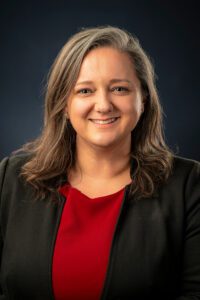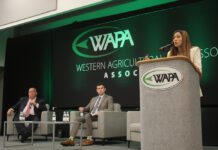
It’s been a busy few weeks for Shannon Douglass. Since being elected president of the California Farm Bureau Federation in early December, she has been getting used to what she calls “a new normal.”
“I already had pretty crazy days before,” she said via Zoom.
On this mid-December day, she’s been up since 5 a.m., returning emails and texts and juggling meetings while sorting calves and handling work at the diversified farm she and her husband, Kelly Douglass, operate near the Glenn County town of Orland. By 9 a.m., she was sitting at CFBF’s office in Sacramento, 100 miles south of Douglass Ranch. By 4:30 that afternoon, she planned to head back to Orland for dinner with her husband and their 12-year-old son.
Hectic as it’s been, “it’s a blessing the Farm Bureau’s elections happen in the wintertime when farming is calmer,” she said.
Elected at CFBF’s 105th annual meeting, held Dec. 1-6 in Reno, Nev., Douglass succeeds Jamie Johansson, who served for the past six years as the organization’s president.
Douglass comes to the top role with a clear view of the responsibilities and challenges of leading California’s diverse agricultural industry and CFBF’s 29,000 members.
Although she wasn’t raised on a farm, this California native had an early interest in agriculture and participated in 4-H and Future Farmers of America as a teenager. She later earned ag-related bachelor’s and master’s degrees from California State University, Chico. In 2003, soon after college, Douglass and her husband, whose family had once operated a dairy, launched their own Douglass Ranch. Slowly, she said, they built the operation, “getting very creative in finding property to graze cattle” and grow other crops. Today, they raise cattle and grow walnuts, corn and forage crops.

In the years after college, she supplemented her on-farm role by working for the Association of Pest Control Advisors, CSU Chico and CalAgJobs. She served as a director for the Glenn County Farm Bureau. She was chair of the California Farm Bureau’s Young Farmers and Ranchers State Committee. Douglass graduated from the Leadership Farm Bureau program and the California Agricultural Leadership Program. She also participated in the American Farm Bureau Federation Leadership Partners in Advocacy Leadership program. She is a former director of the Glenn County Resource Conservation District. Moreover, Douglass served three two-year terms as first vice president of the CFBF before her recent election to statewide Farm Bureau president.
West Coast Nut recently spoke with Douglass about her plans for her two-year term leading CFBF, how the organization is making a difference for farmers, and the challenges she sees for the nation’s No. 1 ag state.

Q. What will be your top three priorities as CFBF president?
Water, of course, is tremendously important to our members up and down the state, often for different reasons and challenges. It depends on the area they’re in. A ton of our members, primarily in the Central Valley, are facing challenges with SGMA [the Sustainable Groundwater Management Act] and adopting those plans. We’ve got others farther north where there’s the possibility finally for some increased water storage, which would be wonderful. Further south, they face some different issues with Colorado River water. We’re thankful CFBF has a fantastic staff working on water issues on the advocacy as well as legal side.
There’s also a lot of interest on the labor front, and what we might do, and looking at federal possibilities. That’s critically important to our members. The flip side is the technology piece and how that’s going to be incorporated. Last year, the CFBF worked with drones and how to better utilize them on farms.
The insurance issue is still really challenging for our members, where they can and can’t get insurance, particularly in our fire-prone areas.
Q. How will your experience as a walnut grower influence your CFBF role?
All our life experiences are important to bring to the table. The diversity of experiences is helpful because these are complex problems. I haven’t done a ton of work in the international trade space. It’s our experiences on the home front, the battles we’ve faced and the challenges we’ve overcome that will help frame the decisions we’ll make. Those struggles help provide a more complete balanced picture. Part of the driving force is understanding the challenges our farmers are facing.
Q. In 2013, you founded CalAgJobs, an online listing for California ag employers and job seekers. Why? In what way has it helped farmers and other ag businesses?
I was kind of accidental into that space. I knew people, and I had people calling me, saying, “Do you know someone we could hire for this job?” A lot of people needed to reach ag people, and there wasn’t a great way to do that. Traditional job boards were so generic and not so strong in the ag space. We need people with that ag background and experience. It’s been a cost-effective way for people to find the agriculturalists they need in a variety of roles. I still own it in partnership, but I’m only lightly involved now. Doing work for CFBF makes it quite difficult for me to do other work.
Q. What does it say that CFBF has elected a woman to serve as its president for the first time since it was founded in 1919?
There have been a lot of women involved in agriculture, on farms and in agribusiness, for a long time. Some outside of ag believe farming is something only men do. But those in the ag industry know women have been involved for a long time. There were very important women before me who were the trailblazers decades ago, even making sure there was that seat at the table. This just reflects the changing face of agriculture. The last census numbers showed over 30% of farms in the country are owned or managed by women. That number’s been increasing. I’m just glad to be one of them.
Q. What are some examples of how CFBF has really made a difference for farmers, ranchers and other ag businesses in the last three or four years?
One that’s fairly fresh was the work we did to help defeat Proposition 15 in 2020. That initiative would have allowed reassessment and higher property taxes on a variety of business properties, including agricultural structures and improvements. If it had passed, Prop 15 would have resulted in an incredible increase in the tax burden for farms and ranches across California.
We’ve also worked a lot on the insurance front to help expand farmers’ access so they are eligible for FAIR Plan insurance coverage in high-risk properties that no one is insuring. We were able to make some changes through SB 11 that expanded the ability of farmers, wineries, vineyards and others to access and navigate the state-run Fair Plan. There’s been tremendous change in the insurance industry in California because of the fires of the last few years. If you can’t get insurance on your house, your farm or your business, it drastically reduces your ability to do business.
Q. What are the biggest challenges facing California agriculture?
It’s really hard to ignore the regulatory challenge we face in California. A 2018 study from Cal Poly, San Luis Obispo showed that, in the previous 10 years, regulatory costs for produce growers on the Central Coast had increased by 795%. The study said that, since 2006, new state and federal rules have imposed significantly higher regulatory burdens on growers, specifically related to food safety, water quality, labor wages, air quality, and worker health and safety. SGMA has brought additional regulations. All these bring more paperwork. Whether you’re hiring someone or you’re having to do it, it’s a tremendous burden our farmers face. It’s tough to do business in California with those regulatory challenges, not to mention things like our fuel bills and other things that are more expensive than in some of our competing states.
Q. What do you see as opportunities?
We are so fortunate to have this incredible climate in California that allows us to grow such an abundance and diversity of food. We have this incredible access to ports, so important in trade. I often think about our forefathers who trailblazed this state. It was not an easy thing to do. There is still some element of that grit among many Californians, a genetic piece from those who were willing to make that trek to this new frontier and take on the challenges. We’re the type of people who are ready for challenges. We’re going to find ways to do things a little differently and perhaps better. Farm Bureau is going to be a huge part of helping our farmers in the years to come. I strongly feel that, while there are huge challenges ahead, the future is very bright for California farmers.










